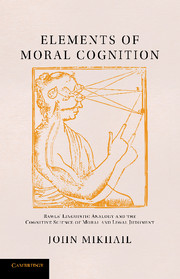 Elements of Moral Cognition
Elements of Moral Cognition Book contents
- Frontmatter
- Contents
- List of Tables and Figures
- Preface
- PART ONE THEORY
- PART TWO EMPIRICAL ADEQUACY
- PART THREE OBJECTIONS AND REPLIES
- 7 R. M. Hare, Peter Singer, and the Distinction between Empirical and Normative Adequacy
- 8 Thomas Nagel and the Competence–Performance Distinction
- 9 Ronald Dworkin and the Distinction between I-Morality and E-Morality
- PART FOUR CONCLUSION
- Appendix: Six Trolley Problem Experiments
- Bibliography
- Index
8 - Thomas Nagel and the Competence–Performance Distinction
Published online by Cambridge University Press: 07 September 2011
- Frontmatter
- Contents
- List of Tables and Figures
- Preface
- PART ONE THEORY
- PART TWO EMPIRICAL ADEQUACY
- PART THREE OBJECTIONS AND REPLIES
- 7 R. M. Hare, Peter Singer, and the Distinction between Empirical and Normative Adequacy
- 8 Thomas Nagel and the Competence–Performance Distinction
- 9 Ronald Dworkin and the Distinction between I-Morality and E-Morality
- PART FOUR CONCLUSION
- Appendix: Six Trolley Problem Experiments
- Bibliography
- Index
Summary
It appears to me that in Ethics, as in all other philosophical studies, the difficulties and disagreements, of which its history is full, are mainly due to a very simple cause: namely to the attempt to answer questions, without first discovering precisely what question it is which you desire to answer. I do not know how far this source of error would be done away, if philosophers would try to discover what question they were asking, before they set about to answer it; for the work of analysis and distinction is often very difficult: we may often fail to make the necessary discovery, even though we make a definite attempt to do so. But I am inclined to think that in many cases a resolute attempt would be sufficient to ensure success; so that, if only this attempt were made, many of the most glaring difficulties and disagreements in philosophy would disappear.
– G. E. Moore, Principia EthicaNAGEL'S CRITICISMS OF RAWLS' LINGUISTIC ANALOGY
Thomas Nagel's criticisms of Rawls' linguistic analogy may be found in his 1973 review of A Theory of Justice, “Rawls on Justice” (Nagel 1973). Nagel begins by summarizing Rawls' conception of moral theory in broad terms:
Rawls believes that it will be more profitable to investigate the foundations of ethics when there are more substantive ethical results to seek the foundations of. […]
- Type
- Chapter
- Information
- Elements of Moral CognitionRawls' Linguistic Analogy and the Cognitive Science of Moral and Legal Judgment, pp. 228 - 265Publisher: Cambridge University PressPrint publication year: 2011


